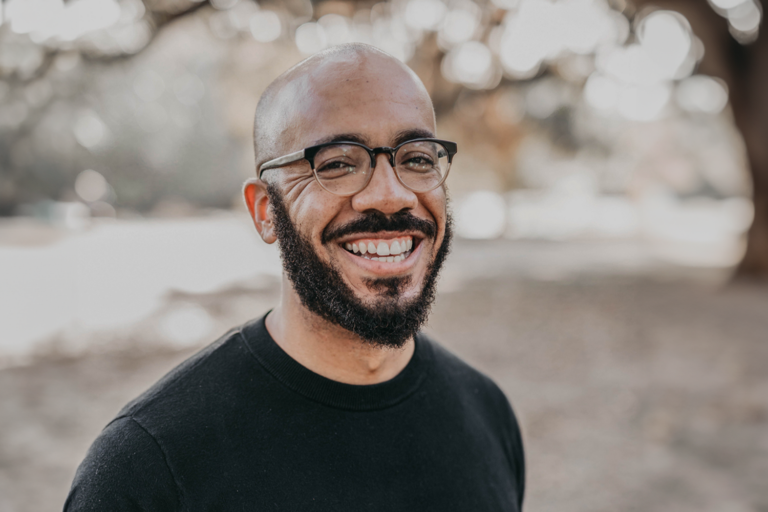Reliquary: Histories Incarnate
In October of 2012, when my grandmother called, asking if I wanted to go vote for the president, I drove her across Memphis to a church polling place on Poplar and East Parkway. I watched my grandmother from behind a line duct-taped onto the carpet. She leaned on her cane, her spotted hand hovering over the screen. She jabbed the screen a little too hard, casting her second vote for President Obama. I helped her place the I Voted Today! sticker above her heart and the pacemaker humming there, under her skin.
It’s in moments like these that I am struck by the sheer scope of my grandmother’s life. She was born in Mississippi in 1929, a month before the stock market crashed and the Great Depression began. As soon as she graduated high school, my grandmother started working as a telephone operator with AT&T. They trained her, re-shaping her Southern drawl, and to this day she retains a textbook-perfect pronunciation of numbers, exclusively. Eventually she moved from Tupelo to Memphis, married a World War II veteran ten years older than her, and gave birth to my father and my aunt.
On Election Day, a month after we went to vote, broadcasters announced President Obama would serve a second term. My phone rang immediately, and I knew it was my grandmother. She told me she’d stayed up late to watch the election results come in. She told me she figured all her neighbors could hear her, clapping and crying in her bed.

Many years earlier, just before my father’s fourteenth birthday, he broke his nose swinging from a handrail in a grocery store and my grandparents took him to the hospital in downtown Memphis. While they were there, Martin Luther King, Jr. was shot and killed a few blocks away, at the Lorraine Motel.
I imagine my family crowded around my father’s hospital bed, the lights turned down low, taking in the news. I wonder how they heard. Maybe, that night in the hospital, my grandfather left to buy cigarettes — by 1968 he was smoking three packs a day. My grandfather died of emphysema before I was born, so I imagine him as he is in the portrait that hangs in my grandmother’s living room: standing hunched and alone in a sparse green field, already sick. I imagine him like this, shriveled and older than he actually was that night in early April, on his way to the corner store or the waiting room or the cafeteria, when he felt the city trembling with nervous energy and knew something terrible had happened.
The night Martin Luther King was killed, the National Guard was called in. This is a detail my grandmother always points out, eyebrows raised, still surprised. A curfew was ordered, and nurses told my family to stay and spend the night in the hospital. My grandparents talked about it and decided to split up. My grandmother and my father spent the night in the hospital. My grandfather sped home through back streets with his daughter, my aunt, hidden on the floorboards.

When I worked at a coffee shop downtown, one street over from the Lorraine Motel — now the Civil Rights Museum — I would sometimes walk to the Museum after I clocked out. There were always small crowds lingering around the entrance, people turning from the spot where King stood on the balcony to look at the building across the street, where the bullet came from.
On the balcony of the Lorraine Motel there is a beveled square of concrete stained with blood. I’ve seen the faint red streak arcing across the concrete myself and could not explain it. There’s something about the blood’s presence, and the museum’s claims that they have done nothing to preserve the stain, which makes it seem like a reliquary: a sliver cut from the whole, made somehow holy. This blood is a powerful reminder of history’s presence in our time. This blood is history incarnate.
As a preacher’s kid, I’ve struggled to believe in Jesus as an incarnate God. I’ve come to believe in a historical Jesus, a man who might have been just as puzzling and prophetic as Martin Luther King. And while I don’t believe in a Jesus who was the literal son of God, an immortal man wrapped up in divinity, I do believe in the power of the story of incarnation, and all that it challenges us to make of our lives here on earth.
The story of incarnation reminds us that the kingdom of God is here on earth, in our midst, not in some unseen heaven we will only get to after our deaths. Incarnation reminds us that we are called to care for each other, to treat each other as we would want to be treated, and to be good stewards of the planet we’ve been entrusted with. I see this message in Dr. King’s life, too: incarnation is everywhere in his faith, in his tireless work, and in his hope for the beloved community here on earth.

This year, it’s another election year, and now my grandmother herself is in a downtown Memphis hospital. She fell and broke her hip, and is upset that she missed her chance to vote in the Tennessee primary. She wears the shirt we bought her a few years ago at the Clinton Library in Arkansas, with “I Miss Bill” printed on the back.
The world is not so different than it was in 1968. America seems to have arrived at a crossroads, yet again. As the country looks ahead to its next president, we are still torn between fear and hope. Black bodies are still being torn apart by the forces of white supremacy. This year, Easter falls a week before the anniversary of Martin Luther King’s assassination. As we draw nearer to both, I find myself revisiting my family’s story of the night Dr. King was killed, forty-eight years ago.
There have been times I’ve thought I could slip my feet in and out of my family’s shoes, and could imagine history unfolding alive through their stories. Now, I have a tendency to push back. I wonder if I’m feeling the wrong things, or entering into the wrong stories, or if it’s wrong to even try to inhabit someone else’s experience.
I know that on the night Dr. King was assassinated, my family chose to split up. I don’t know what their decision means, even now, but I know that having options was one small result of centuries of privilege. This story allows me a glimpse into history through a narrow lens, placing decision-making squarely on my grandparents, still young parents themselves. This is how history happens: decision by decision, story by story.
I imagine myself there, with my family, and I don’t know who I would’ve gone with — whether I would have spent that night in a hospital bed or hidden in the car’s floorboards as it sped through Memphis’ side streets. Maybe I would have chosen some entirely different journey. Sometimes I think the wondering gets me nowhere. Sometimes I think all I can do is revisit the places, see the blood-stained concrete, and know these stories are as present in our time as they’ve ever been.


